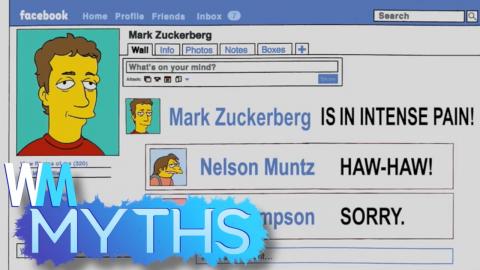Top 5 Facebook Myths

We use it almost every day, but much do we really know about this social media juggernaut?
Welcome to WatchMojo's Top 5 Myths, the series that finds the biggest myths people actually believe and dispels them one by one.
In today's installment we're counting down the 5 myths about Facebook that should be blocked.
#5: Facebook sells personal information to third parties
The reality behind this myth can be found right on the Facebook site itself, which states in plain English that the site doesn't sell information to third parties, and never will. Facebook encourages their users to tailor each profile's privacy settings to suit their own personal needs, ensuring that the users don't share anything they don't intend to with their followers.
Though public pages are a different story. For example, it's not uncommon for pages to advertise to a user which of their friends also likes that artist or product; while Facebook's legal terms also state that it's ok for the site to utilize their users' posts for their own advertising. So just be mindful of what you put out there.
#4: Sean Parker discovered the site after a one-night stand
The 2010 movie "The Social Network" was highly successful in its dramatization of the Facebook origins. The screenplay from Aaron Sorkin implied that Former Facebook president, Sean Parker, actually discovered the site after a collegiate one-night stand. A 2010 Vanity Fair profile on Parker quoted the Napster co-founder on how he was actually made aware of Facebook – which was from the computer of a Stanford student, the girlfriend of Parker's former roommate. It wasn't long afterwards that the web entrepreneur and former hacker would join Facebook founder Mark Zuckerberg in becoming two of the most important figures of the social media revolution.
#3: Facebook is declining in popularity
Every now and then, a news story or social media study may come along claiming that Facebook is declining in popularity. According to EMarketer.com, however, over sixty percent of internet users accessed a social media site in 2016, with their data also securing Facebook's status as a social media giant. The site's research stated that many young people were adopting sites like Instagram, Snapchat and Twitter in addition to FB, as opposed to replacing it in their daily routines. EMarketer also published a piece showing that over a billion people accessed Facebook on their phones during the year, a statistic which was up twenty-one percent from 2015.
#2: Mark Zuckerberg, Facemash and The Social Network
The aforementioned film "The Social Network" opens up with a disgruntled Mark Zuckerberg, after being recently dumped, creating a makeshift website titled "Facemash," whereupon students at Harvard can compare the hotness of female students. This leads to a crashed Harvard web network, and the beginnings of Facebook as an international social media giant. Reality was a bit different to Fincher and Sorkin's film, however, as not only did Facemash use both female and male student profiles, but the site's traffic actually only slowed down Zuckerberg's personal computer.
He did, in fact, only shut down Facemash of his own volition following criticisms of copyright and privacy.
#1: Facebook owns what you post
You might have noticed a number of strangely worded, vaguely legal-sounding jargon when perusing your daily Facebook feed. Usually, these are found in the form of status updates, and contain phrases which usually say something about "denying permission for Facebook to use their photos, information or posts". It’s a tricky subject, but one thing is certain: Facebook and their terms of service have never claimed that any of their users' posts are owned by the site, but instead state that anyone signing up for Facebook is giving the site permission to use that data. Any content posted by Facebook users remains their property, but any question with regards to its use should either be pursued with a legitimate lawyer, or simply by deactivating your profile.
So, how many of these Facebook myths did you believe? For more status updating top tens and Harvard hacking top fives, be sure to subscribe to WatchMojo.com!